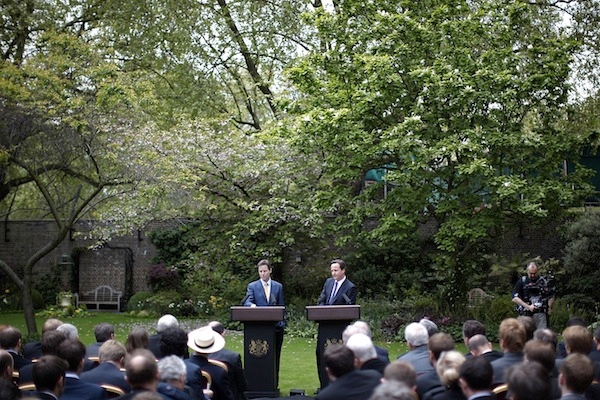The Coalition reaches its proalition peak today with the publication of the mid-term review, but Downing Street strategists are keen to spin out the good feeling for as long as possible. David Cameron and Nick Clegg will launch the review in their first joint appearance in Downing Street since December 2010, but the details of many of the measures on childcare, transport, housing and pensions won’t come today. Instead, we’ll see a trickle of announcements over the next couple of months.
The leaders have already published a foreword to the review document, which starts by restating the Coalition’s central mission: deficit reduction. This is the area where the two parties don’t really do differentiation, save for the occasional intervention by Vince Cable on the need for more demand-side measures. The foreword says:
‘Dealing with the deficit may have been our first task, but our most important task is to build a stronger, more balanced economy capable of delivering lasting growth and widely shared prosperity. In essence, this involves two things: growing the private sector, and reforming the public sector so that what the Government does – and the money it spends – boosts, rather than undermines, Britain’s competitiveness.
‘Meeting this challenge is imperative if Britain isn’t to fall behind in the global race, for while the Western economies have stalled in recent years, the emerging economies such as India, China, Indonesia, Malaysia, Brazil, Mexico and Turkey have been surging forward. In the coming years, some countries in the developed world will respond to this shift in economic power; but some will not. Those that do will prosper. Those that do not will decline. It is that simple.’
It is also an appeal to those backbenchers and party supporters grizzled by two and a half years of coalition and Labour’s lead in the opinion polls, with the foreword closing on these words:
‘And our resolve is unwavering: we will continue to put political partisanship to one side to govern in the long-term interests of the country.’
The phrase ‘global race’, which featured so heavily in David Cameron’s autumn conference speech and again in the autumn statement, makes another two appearances here: the idea is to introduce a sense of urgency about making Britain competitive. This sort of language will appeal particularly to those Conservative backbenchers of the Britannia Unchained persuasion.
But today’s review is about the government’s ambitions beyond the deficit. Because while the parties came together in the economic interest, that hasn’t been all the government has achieved. So the review foreword also praises progress so far on welfare and education, tax cuts for low earners. And the new measures on childcare, housing, transport, social care, state pensions and freedoms are all positive ones, with scant detail today. It will be interesting to see who takes responsibility for announcing each individual measure; as James reported yesterday, David Cameron has already seized childcare as a ‘personal priority’, but it may fall to someone lower down in the ranks with thick skin to announce that the government’s response to the Dilnot recommendations on social care are not as ambitious as originally hoped.
The funny thing is that while the leaders of the coalition parties are keen today to present a vision of a united coalition, both are already thinking about their strategy for 2015. James pointed out in his political column this week that the war footing the Conservatives are already on is one you’d expect six months from an election, not 29. Tonight the 2020 group of Conservatives presents its distinct Conservative policy vision to George Osborne, while Nick Clegg hasn’t just called for a differentiation strategy: he’s already practising it. The task the two leaders have at their press conference today will be to reconcile the mid-term review’s call for unity with this reality.







Comments